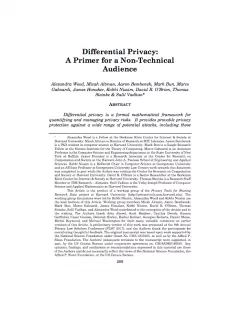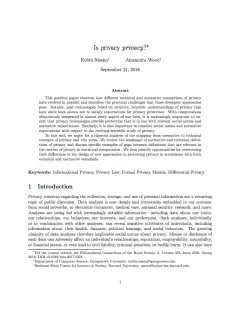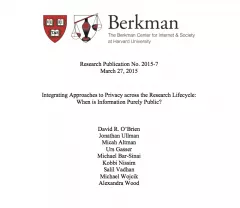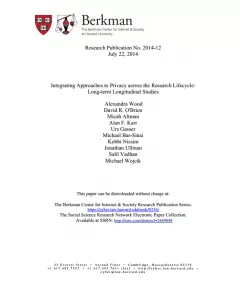Privacy Tools
The Privacy Tools Project is a broad effort to advance a multidisciplinary understanding of data privacy issues and build computational, statistical, legal, and policy tools to help address these issues in a variety of contexts.
Growth in information technology, advances in statistical computing, and the deluge of new and expanding data sources are enabling the mining of large-scale data sets to infer new insights about human characteristics and behaviors and driving demand for large data sets for scientific inquiry, public policy, and innovation. At the same time, these developments are putting enormous pressure on traditional approaches to protecting individual privacy. By leveraging advances in computer science, social science, statistics, and law, the Privacy Tools project aims to further the tremendous value that can come from collecting, analyzing, and sharing data while more fully protecting individual privacy. This effort seeks to translate the theoretical promise of new technical measures for privacy and data utility into definitions and measures of privacy and data utility, as well as practical computational, legal, and policy tools for enabling privacy-protective access to sensitive data in a variety of contexts.
The Privacy Tools project was incubated by Harvard's Center for Research on Computation and Society, and continues to be a collaborative effort between several units at Harvard University (the School of Engineering and Applied Sciences, Institute for Quantitative Social Science, and Berkman Klein Center for Internet & Society), Georgetown University (Computer Science Department), Boston University (Computer Science Department) and MIT (Center for Research in Equitable and Open Scholarship). Executive Director and Harvard Law School Professor of Practice Urs Gasser leads the Berkman Klein Center's role in this exciting initiative, which brings the Center's institutional knowledge and practical experience to help tackle the legal and policy-based issues in the larger project. The Center is working with faculty, fellows, research assistants, and collaborators across the wider project team to distill key definitional issues, explore new and existing legal and regulatory frameworks, and develop legal instruments, frameworks, and policy recommendations that complement and situate the project’s computational and statistical tools for privacy-protective sharing of data.
The project’s initial unifying focus was the design of tools for privacy-protective sharing of research data in social science data repositories. Over time, it has expanded to address additional use cases, including improving the replicability and reproducibility of data in empirical social science, and bridging the understanding of legal and technical privacy concepts relevant to statistical agencies such as the US Census Bureau. Members of this team are also part of the Data Co-ops project funded at Georgetown University to develop technical and legal tools for re-envisioning the information ecosystem. In addition to contributing to data publishing infrastructure around the world, the ideas developed in this project aim to benefit society more broadly as it grapples with data privacy issues in many other domains, including public health and electronic commerce.
This material is based upon work supported by the National Science Foundation under Grant No. CNS-1237235, the Alfred P. Sloan Foundation, and the US Census Bureau under cooperative agreement no. CB16ADR0160001. Any opinions, findings, and conclusions or recommendations expressed in this material are those of the author(s) and do not necessarily reflect the views of the National Science Foundation, the Alfred P. Sloan Foundation, or the US Census Bureau.

















